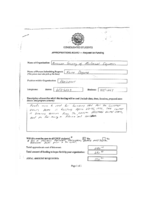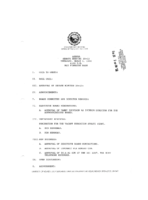Search the Special Collections and Archives Portal
Search Results
Hank Harrison Photograph Collection on Helldorado Days
Identifier
Abstract
The Hank Harrison Photograph Collection on Helldorado Days contains two black-and-white photographs of the Helldorado Days festival in Las Vegas, Nevada from approximately 1940 to 1977. The first photograph depicts a rodeo clown distracting a bull; the second photograph is of Ned Romero, an actor in Helldorado.
Archival Collection
Roger D. Foley Papers on United States v. Cappaert
Identifier
Abstract
The Roger D. Foley Papers on United States v. Cappaert are comprised of materials collected by District Judge Roger D. Foley while performing his duties as judge in
Archival Collection
Basic Magnesium, Inc.
Basic Magnesium, Inc. (BMI) formed in June 1941 as a joint venture between Basic Refractories, Inc. of Cleveland, Ohio and Magnesium Elektron, Limited of England. Basic Refractories, Inc. owned mining claims in Gabbs Valley, Nye County, Nevada, which produced the magnesite and brucite needed to produce magnesium metal. Magnesium Elektron, Limited owned the patent for the electrolytic process of extracting metallic magnesium from these minerals.
Corporate Body

Meeting minutes for Consolidated Student Senate University of Nevada, Las Vegas, February 10, 1993
Date
Archival Collection
Description
Text

Meeting minutes for Consolidated Student Senate, University of Nevada, Las Vegas, October 16, 2000
Date
Archival Collection
Description
Text

Kim You Taing oral history interview: transcript
Date
Archival Collection
Description
Oral history interview with Kim You Taing conducted by Vanessa Concepcion, Cecilia Winchell, and Stefani Evans on November 15, 2021 for Reflections: The Las Vegas Asian American and Pacific Islander Oral History Project. Kim discusses his upbringing in Cambodia during the Cambodian Civil War, the death of his siblings from tragedy and his father from racially-motivated war crimes, and his immigration to the United States as a refugee. He shares how he and his mother lived and worked in the United States, first in Seattle, Washington and then in Las Vegas, Nevada. Kim talks about his work in the hospitality industry in various Vegas hotels and casinos and his membership with the Culinary Workers Union advocating for Asian workers. He also discusses family life with his wife and daughter and his plans to retire.
Text
Juanita Greer White Papers
Identifier
Abstract
The collection is comprised of the personal, professional and business papers of Dr. Juanita Greer White from 1927 to 1980. Included are correspondence, booklets, dissertations, minutes, newsletters, newspaper clippings, and various other materials linked to women's organizations and Nevada organizations relating to education, health, and aging. Other material includes documents from her work in the Nevada State Legislature, books, catalogs, chemistry papers, plaques, and campaign materials.
Archival Collection
Regional subject files, 1859, 1908, 1970-2015
Level of Description
Scope and Contents
The regional subject files include materials collected by anthropologist Katherine Spilde about Native American gaming, Native American communities in the United States, and the US and international gaming industries. The materials date from 1859 to 2015, with the bulk of materials dating from 1990 to 2010. Materials dating from the nineteenth and early twentieth centuries are a reproduction of a federal treaty and an ethnohistorical essay. The majority of the materials document Native American gaming following the passage of the 1988 Indian Gaming Regulatory Act. The papers include research and subject files created by Dr. Spilde during her employment with the National Gambling Impact Study Commission (NGISC), National Indian Gaming Association (NIGA), and Harvard Project on American Indian Economic Development (HPAIED). The materials document Native American gaming enterprises both on and off reservations, the socioeconomic impact of gaming, the political history of gaming in the US, and international gaming. The series includes socioeconomic reports, testimonies, correspondence, memos, press releases, photographs, audiovisual materials, promotional materials, brochures, fact sheets, summaries, booklets, pamphlets, advertisements, tourism materials, journal articles, legal briefs, legislative documents, court opinions, notes, presentations, conference materials, periodicals, community newspapers, and newspaper articles.
The collection contains documentation on a number of Native American nations, including the Misi-zaaga'iganiing Anishinaabeg (Minnesota Chippewa Tribe, Mille Lacs Band); Gaa-waabaabiganikaag Anishinaabeg (Minnesota Chippewa Tribe, White Earth Band); Forest County Bodéwadmi (Forest County Potawatomi Community); Ho-Chunk Nation of Wisconsin; Mashantucket Pequot Indian Tribe; Mohegan Tribe of Indians; Tulalip Tribes of Washington; Sisseton-Wahpeton Oyate of the Lake Traverse Reservation; Standing Rock Sioux Tribe of North and South Dakota; Mandan, Hidatsa, and Sahnish (Arikara) (Three Affiliated Tribes of the Fort Berthold Reservation, North Dakota); and Mississippi Band of Choctaw Indians. Other communities are also represented in the series, but to a lesser extent. In addition to materials about gaming and casinos, Dr. Spilde also collected documents, photographs, and audiovisual materials about Native American culture in general. The series documents regional and national trends in Native American gaming, and the greater gaming industry. Materials trace federal and state relationships with individual Native American nations, specifically concerning gaming enterprises.
Archival Collection
Collection Name: Katherine A. Spilde Papers on Native American Gaming
Box/Folder: N/A
Archival Component

History of George Burton Whitney and Lovina Syphus, his wife and Luke Syphus and Christiana Long, Lovina's parents, undated Genealogical data sheet, John Mathieson Bunker and Mary Etta Syphus
Archival Collection
Description
From the Syphus-Bunker Papers (MS-00169). The folder contains documents about the history of George Burton Whitney and his wife, Lovina Syphus, and Luke Syphus and Christiana Long, Lovina's parents, and a genealogical data sheet for John Mathieson Bunker and Mary Etta Syphus.
Text

Meeting minutes for Consolidated Student Senate University of Nevada, Las Vegas, March 1, 1990
Date
Archival Collection
Description
Text
